NUR2102 Medication Management Assignment: Clinical Reasoning for COPD
VerifiedAdded on 2022/08/29
|9
|2068
|16
Report
AI Summary
This report analyzes the application of the clinical reasoning cycle in the care of a patient, Hadden, suffering from COPD and facing challenges with medication self-management. It outlines the initial steps of the cycle, including identifying priorities such as improving health literacy, understanding the disease, and addressing smoking habits. The report then details appropriate nursing interventions, including health education materials, the teach-back method, and referrals to smoking cessation counselors. Finally, it describes evaluation strategies to assess the effectiveness of the interventions, such as observing return demonstrations, asking questions, and monitoring physiological measurements. The report emphasizes the importance of the clinical reasoning cycle in providing high-quality care for COPD patients and promoting improved medication adherence and overall well-being.
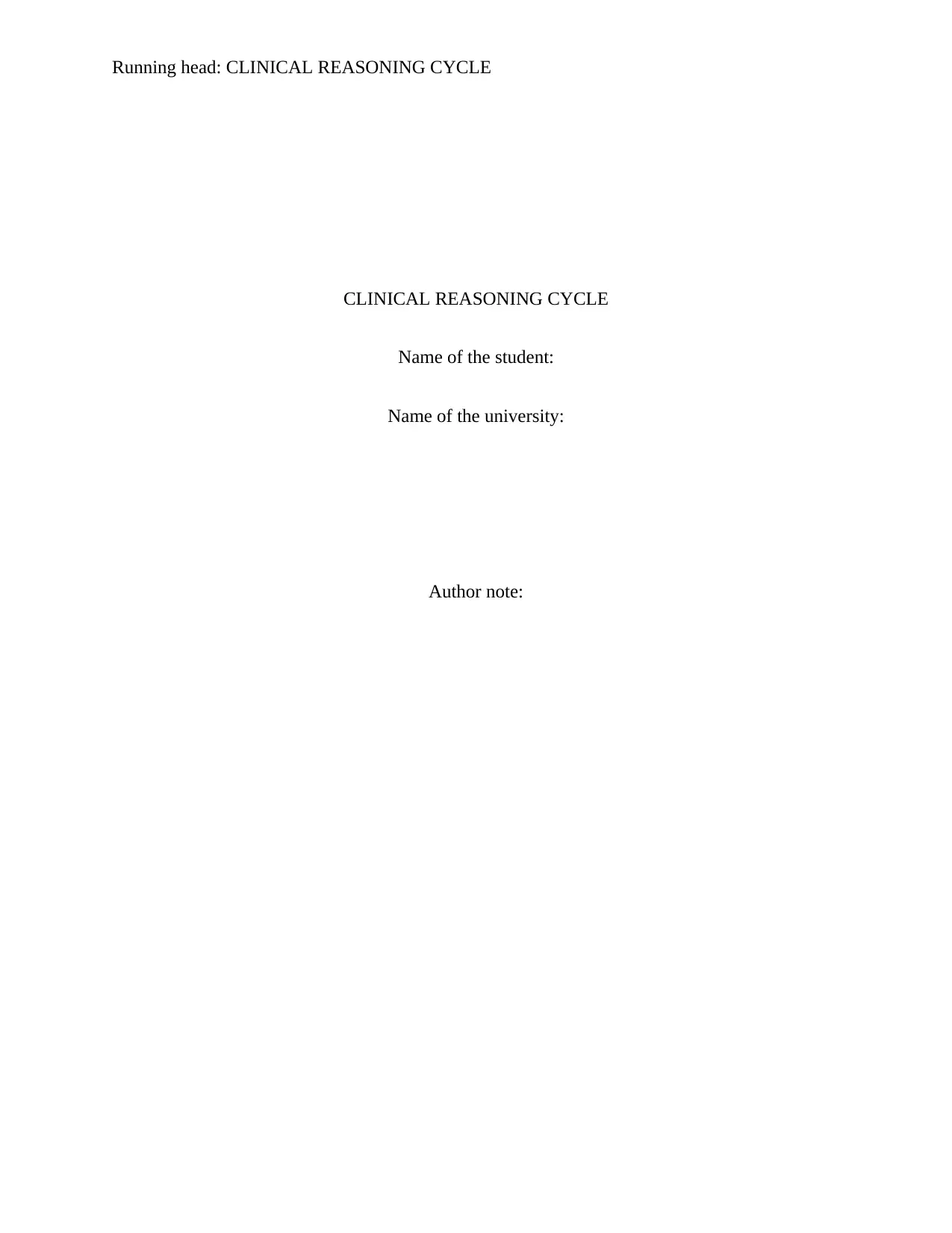
Running head: CLINICAL REASONING CYCLE
CLINICAL REASONING CYCLE
Name of the student:
Name of the university:
Author note:
CLINICAL REASONING CYCLE
Name of the student:
Name of the university:
Author note:
Paraphrase This Document
Need a fresh take? Get an instant paraphrase of this document with our AI Paraphraser
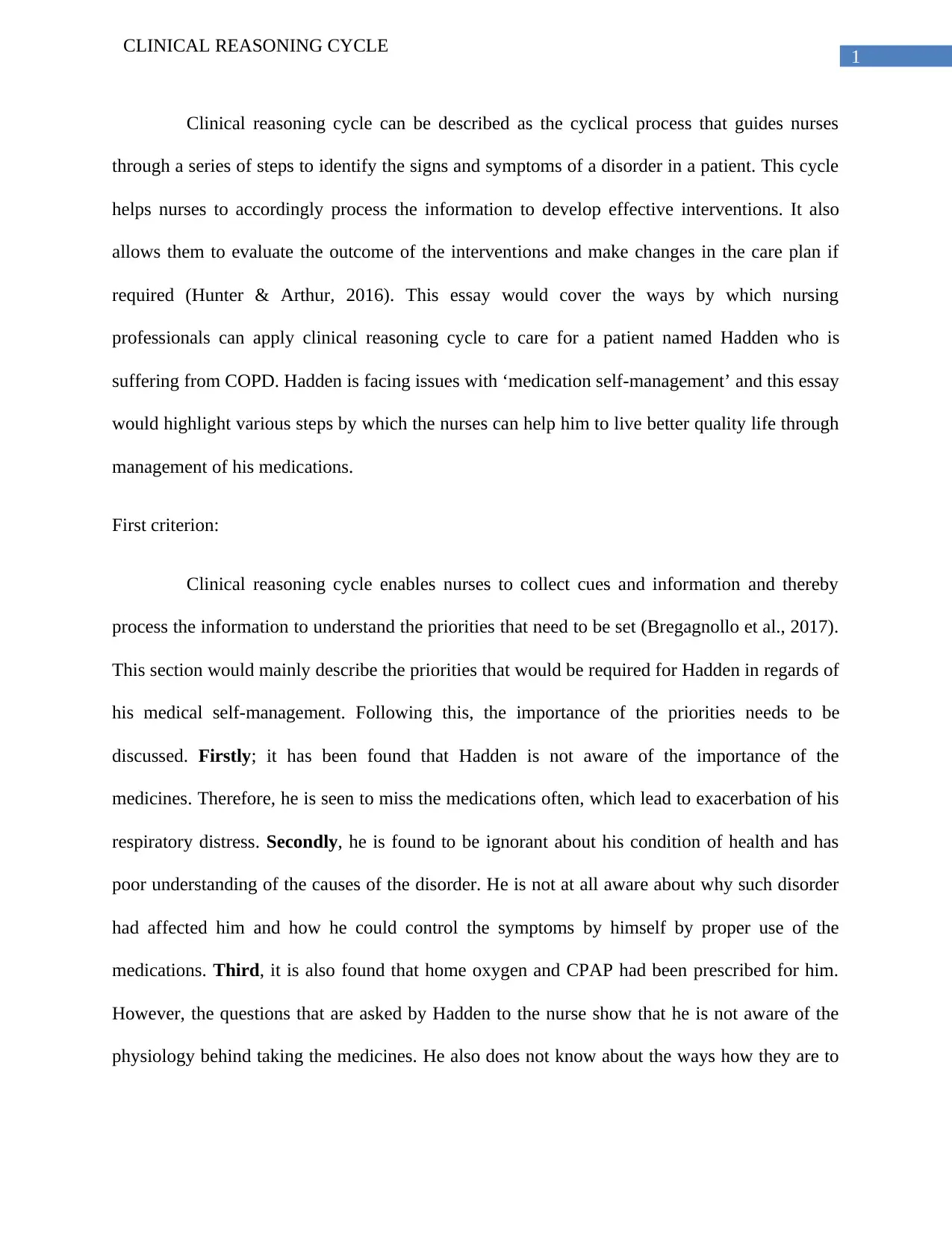
1
CLINICAL REASONING CYCLE
Clinical reasoning cycle can be described as the cyclical process that guides nurses
through a series of steps to identify the signs and symptoms of a disorder in a patient. This cycle
helps nurses to accordingly process the information to develop effective interventions. It also
allows them to evaluate the outcome of the interventions and make changes in the care plan if
required (Hunter & Arthur, 2016). This essay would cover the ways by which nursing
professionals can apply clinical reasoning cycle to care for a patient named Hadden who is
suffering from COPD. Hadden is facing issues with ‘medication self-management’ and this essay
would highlight various steps by which the nurses can help him to live better quality life through
management of his medications.
First criterion:
Clinical reasoning cycle enables nurses to collect cues and information and thereby
process the information to understand the priorities that need to be set (Bregagnollo et al., 2017).
This section would mainly describe the priorities that would be required for Hadden in regards of
his medical self-management. Following this, the importance of the priorities needs to be
discussed. Firstly; it has been found that Hadden is not aware of the importance of the
medicines. Therefore, he is seen to miss the medications often, which lead to exacerbation of his
respiratory distress. Secondly, he is found to be ignorant about his condition of health and has
poor understanding of the causes of the disorder. He is not at all aware about why such disorder
had affected him and how he could control the symptoms by himself by proper use of the
medications. Third, it is also found that home oxygen and CPAP had been prescribed for him.
However, the questions that are asked by Hadden to the nurse show that he is not aware of the
physiology behind taking the medicines. He also does not know about the ways how they are to
CLINICAL REASONING CYCLE
Clinical reasoning cycle can be described as the cyclical process that guides nurses
through a series of steps to identify the signs and symptoms of a disorder in a patient. This cycle
helps nurses to accordingly process the information to develop effective interventions. It also
allows them to evaluate the outcome of the interventions and make changes in the care plan if
required (Hunter & Arthur, 2016). This essay would cover the ways by which nursing
professionals can apply clinical reasoning cycle to care for a patient named Hadden who is
suffering from COPD. Hadden is facing issues with ‘medication self-management’ and this essay
would highlight various steps by which the nurses can help him to live better quality life through
management of his medications.
First criterion:
Clinical reasoning cycle enables nurses to collect cues and information and thereby
process the information to understand the priorities that need to be set (Bregagnollo et al., 2017).
This section would mainly describe the priorities that would be required for Hadden in regards of
his medical self-management. Following this, the importance of the priorities needs to be
discussed. Firstly; it has been found that Hadden is not aware of the importance of the
medicines. Therefore, he is seen to miss the medications often, which lead to exacerbation of his
respiratory distress. Secondly, he is found to be ignorant about his condition of health and has
poor understanding of the causes of the disorder. He is not at all aware about why such disorder
had affected him and how he could control the symptoms by himself by proper use of the
medications. Third, it is also found that home oxygen and CPAP had been prescribed for him.
However, the questions that are asked by Hadden to the nurse show that he is not aware of the
physiology behind taking the medicines. He also does not know about the ways how they are to
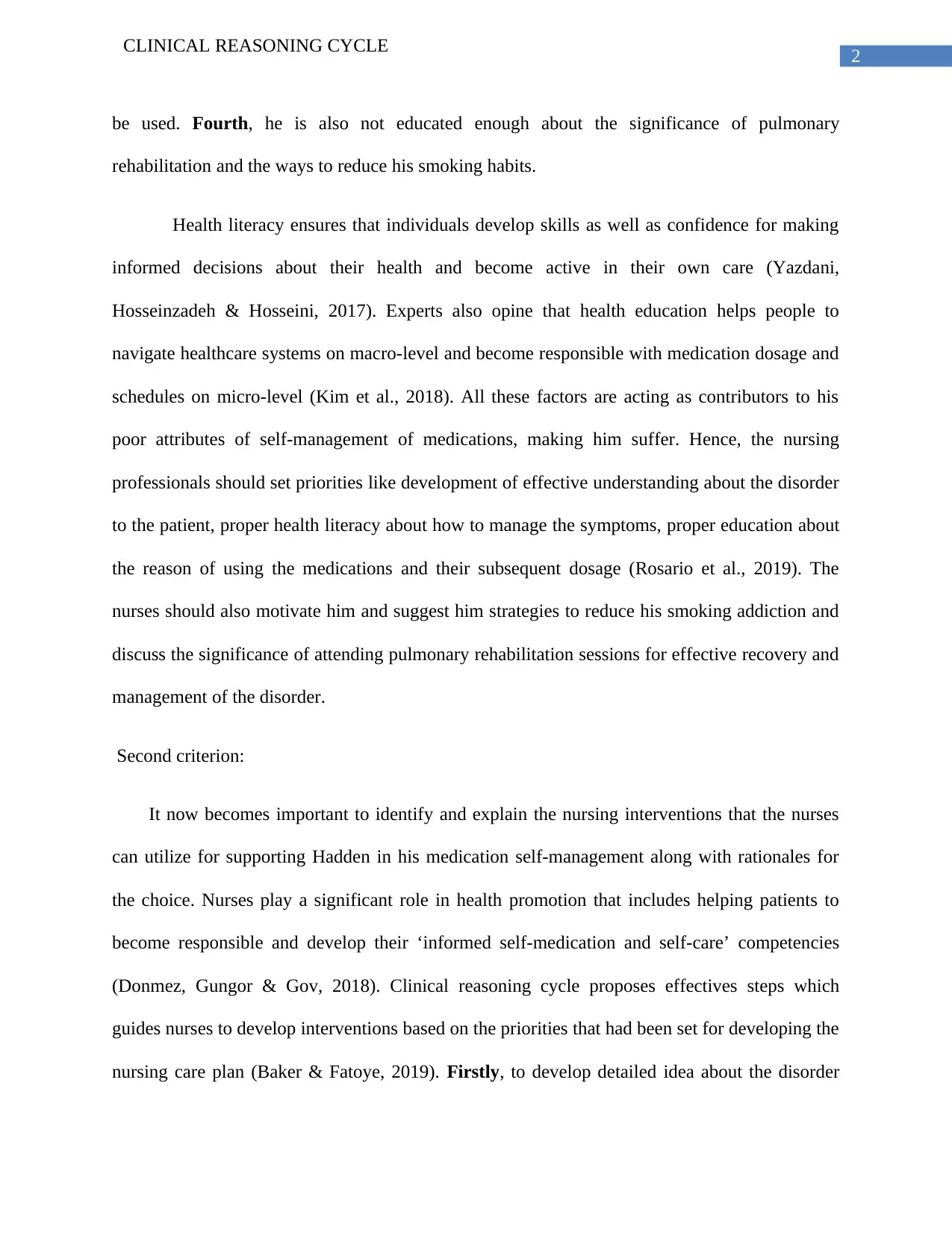
2
CLINICAL REASONING CYCLE
be used. Fourth, he is also not educated enough about the significance of pulmonary
rehabilitation and the ways to reduce his smoking habits.
Health literacy ensures that individuals develop skills as well as confidence for making
informed decisions about their health and become active in their own care (Yazdani,
Hosseinzadeh & Hosseini, 2017). Experts also opine that health education helps people to
navigate healthcare systems on macro-level and become responsible with medication dosage and
schedules on micro-level (Kim et al., 2018). All these factors are acting as contributors to his
poor attributes of self-management of medications, making him suffer. Hence, the nursing
professionals should set priorities like development of effective understanding about the disorder
to the patient, proper health literacy about how to manage the symptoms, proper education about
the reason of using the medications and their subsequent dosage (Rosario et al., 2019). The
nurses should also motivate him and suggest him strategies to reduce his smoking addiction and
discuss the significance of attending pulmonary rehabilitation sessions for effective recovery and
management of the disorder.
Second criterion:
It now becomes important to identify and explain the nursing interventions that the nurses
can utilize for supporting Hadden in his medication self-management along with rationales for
the choice. Nurses play a significant role in health promotion that includes helping patients to
become responsible and develop their ‘informed self-medication and self-care’ competencies
(Donmez, Gungor & Gov, 2018). Clinical reasoning cycle proposes effectives steps which
guides nurses to develop interventions based on the priorities that had been set for developing the
nursing care plan (Baker & Fatoye, 2019). Firstly, to develop detailed idea about the disorder
CLINICAL REASONING CYCLE
be used. Fourth, he is also not educated enough about the significance of pulmonary
rehabilitation and the ways to reduce his smoking habits.
Health literacy ensures that individuals develop skills as well as confidence for making
informed decisions about their health and become active in their own care (Yazdani,
Hosseinzadeh & Hosseini, 2017). Experts also opine that health education helps people to
navigate healthcare systems on macro-level and become responsible with medication dosage and
schedules on micro-level (Kim et al., 2018). All these factors are acting as contributors to his
poor attributes of self-management of medications, making him suffer. Hence, the nursing
professionals should set priorities like development of effective understanding about the disorder
to the patient, proper health literacy about how to manage the symptoms, proper education about
the reason of using the medications and their subsequent dosage (Rosario et al., 2019). The
nurses should also motivate him and suggest him strategies to reduce his smoking addiction and
discuss the significance of attending pulmonary rehabilitation sessions for effective recovery and
management of the disorder.
Second criterion:
It now becomes important to identify and explain the nursing interventions that the nurses
can utilize for supporting Hadden in his medication self-management along with rationales for
the choice. Nurses play a significant role in health promotion that includes helping patients to
become responsible and develop their ‘informed self-medication and self-care’ competencies
(Donmez, Gungor & Gov, 2018). Clinical reasoning cycle proposes effectives steps which
guides nurses to develop interventions based on the priorities that had been set for developing the
nursing care plan (Baker & Fatoye, 2019). Firstly, to develop detailed idea about the disorder
⊘ This is a preview!⊘
Do you want full access?
Subscribe today to unlock all pages.

Trusted by 1+ million students worldwide
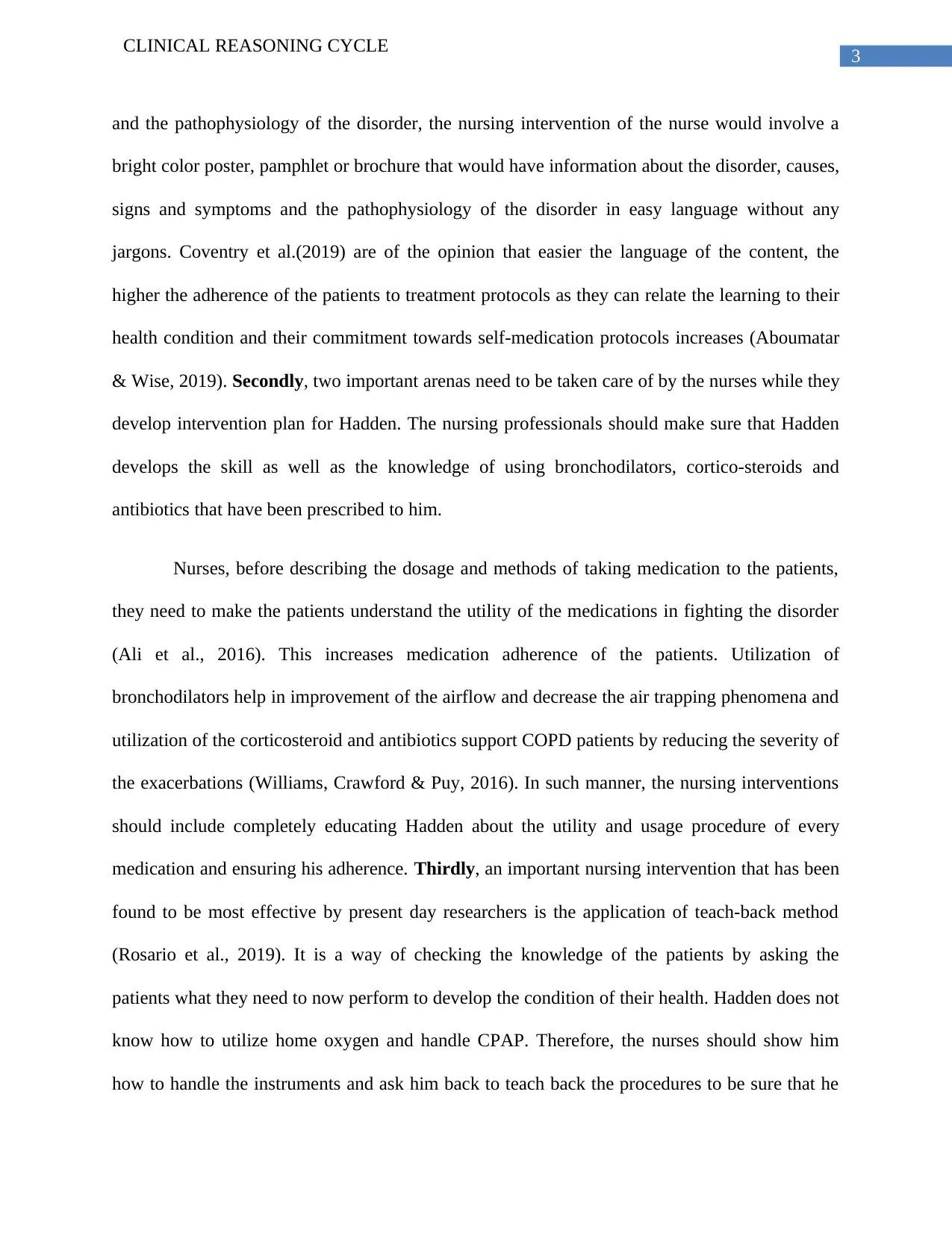
3
CLINICAL REASONING CYCLE
and the pathophysiology of the disorder, the nursing intervention of the nurse would involve a
bright color poster, pamphlet or brochure that would have information about the disorder, causes,
signs and symptoms and the pathophysiology of the disorder in easy language without any
jargons. Coventry et al.(2019) are of the opinion that easier the language of the content, the
higher the adherence of the patients to treatment protocols as they can relate the learning to their
health condition and their commitment towards self-medication protocols increases (Aboumatar
& Wise, 2019). Secondly, two important arenas need to be taken care of by the nurses while they
develop intervention plan for Hadden. The nursing professionals should make sure that Hadden
develops the skill as well as the knowledge of using bronchodilators, cortico-steroids and
antibiotics that have been prescribed to him.
Nurses, before describing the dosage and methods of taking medication to the patients,
they need to make the patients understand the utility of the medications in fighting the disorder
(Ali et al., 2016). This increases medication adherence of the patients. Utilization of
bronchodilators help in improvement of the airflow and decrease the air trapping phenomena and
utilization of the corticosteroid and antibiotics support COPD patients by reducing the severity of
the exacerbations (Williams, Crawford & Puy, 2016). In such manner, the nursing interventions
should include completely educating Hadden about the utility and usage procedure of every
medication and ensuring his adherence. Thirdly, an important nursing intervention that has been
found to be most effective by present day researchers is the application of teach-back method
(Rosario et al., 2019). It is a way of checking the knowledge of the patients by asking the
patients what they need to now perform to develop the condition of their health. Hadden does not
know how to utilize home oxygen and handle CPAP. Therefore, the nurses should show him
how to handle the instruments and ask him back to teach back the procedures to be sure that he
CLINICAL REASONING CYCLE
and the pathophysiology of the disorder, the nursing intervention of the nurse would involve a
bright color poster, pamphlet or brochure that would have information about the disorder, causes,
signs and symptoms and the pathophysiology of the disorder in easy language without any
jargons. Coventry et al.(2019) are of the opinion that easier the language of the content, the
higher the adherence of the patients to treatment protocols as they can relate the learning to their
health condition and their commitment towards self-medication protocols increases (Aboumatar
& Wise, 2019). Secondly, two important arenas need to be taken care of by the nurses while they
develop intervention plan for Hadden. The nursing professionals should make sure that Hadden
develops the skill as well as the knowledge of using bronchodilators, cortico-steroids and
antibiotics that have been prescribed to him.
Nurses, before describing the dosage and methods of taking medication to the patients,
they need to make the patients understand the utility of the medications in fighting the disorder
(Ali et al., 2016). This increases medication adherence of the patients. Utilization of
bronchodilators help in improvement of the airflow and decrease the air trapping phenomena and
utilization of the corticosteroid and antibiotics support COPD patients by reducing the severity of
the exacerbations (Williams, Crawford & Puy, 2016). In such manner, the nursing interventions
should include completely educating Hadden about the utility and usage procedure of every
medication and ensuring his adherence. Thirdly, an important nursing intervention that has been
found to be most effective by present day researchers is the application of teach-back method
(Rosario et al., 2019). It is a way of checking the knowledge of the patients by asking the
patients what they need to now perform to develop the condition of their health. Hadden does not
know how to utilize home oxygen and handle CPAP. Therefore, the nurses should show him
how to handle the instruments and ask him back to teach back the procedures to be sure that he
Paraphrase This Document
Need a fresh take? Get an instant paraphrase of this document with our AI Paraphraser
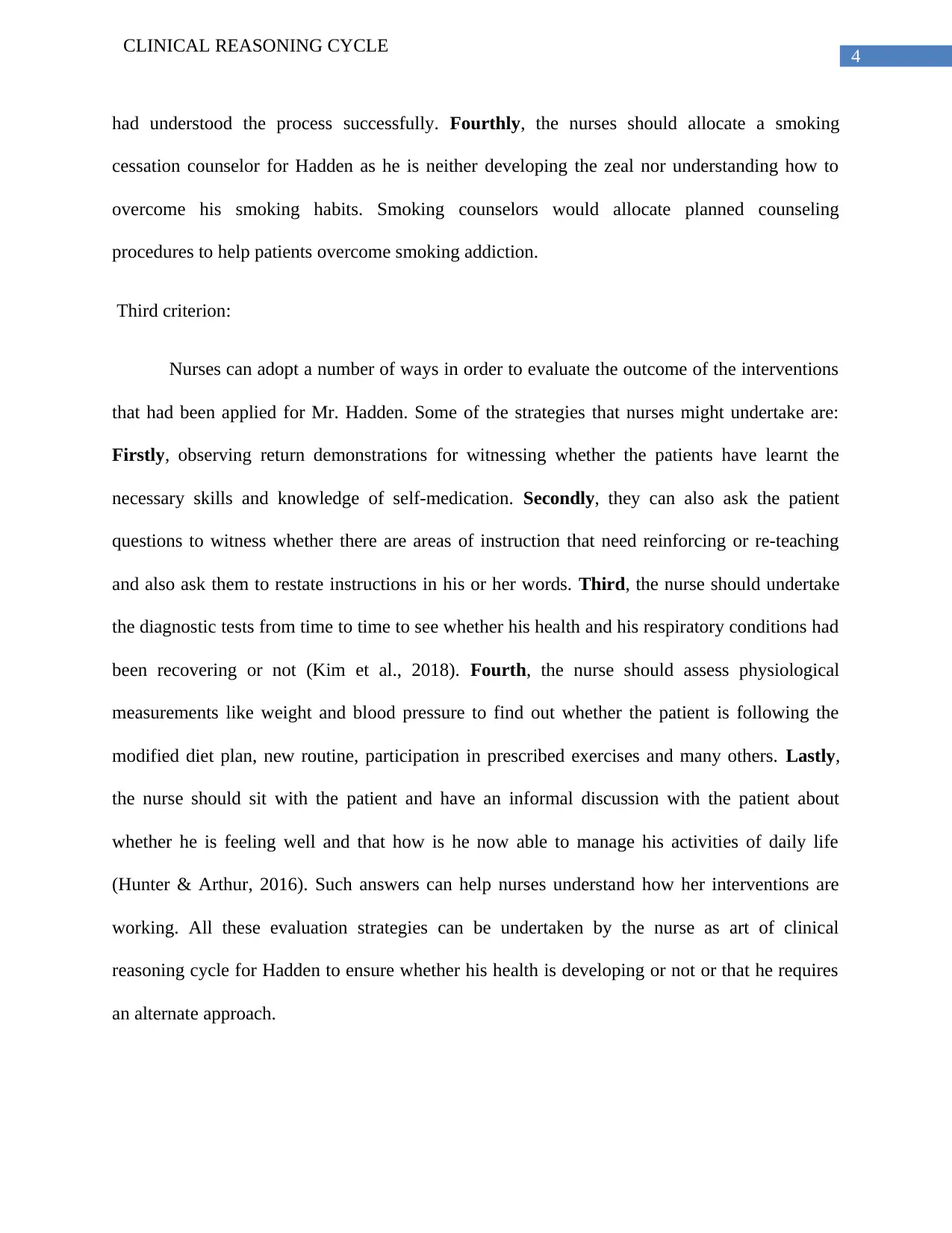
4
CLINICAL REASONING CYCLE
had understood the process successfully. Fourthly, the nurses should allocate a smoking
cessation counselor for Hadden as he is neither developing the zeal nor understanding how to
overcome his smoking habits. Smoking counselors would allocate planned counseling
procedures to help patients overcome smoking addiction.
Third criterion:
Nurses can adopt a number of ways in order to evaluate the outcome of the interventions
that had been applied for Mr. Hadden. Some of the strategies that nurses might undertake are:
Firstly, observing return demonstrations for witnessing whether the patients have learnt the
necessary skills and knowledge of self-medication. Secondly, they can also ask the patient
questions to witness whether there are areas of instruction that need reinforcing or re-teaching
and also ask them to restate instructions in his or her words. Third, the nurse should undertake
the diagnostic tests from time to time to see whether his health and his respiratory conditions had
been recovering or not (Kim et al., 2018). Fourth, the nurse should assess physiological
measurements like weight and blood pressure to find out whether the patient is following the
modified diet plan, new routine, participation in prescribed exercises and many others. Lastly,
the nurse should sit with the patient and have an informal discussion with the patient about
whether he is feeling well and that how is he now able to manage his activities of daily life
(Hunter & Arthur, 2016). Such answers can help nurses understand how her interventions are
working. All these evaluation strategies can be undertaken by the nurse as art of clinical
reasoning cycle for Hadden to ensure whether his health is developing or not or that he requires
an alternate approach.
CLINICAL REASONING CYCLE
had understood the process successfully. Fourthly, the nurses should allocate a smoking
cessation counselor for Hadden as he is neither developing the zeal nor understanding how to
overcome his smoking habits. Smoking counselors would allocate planned counseling
procedures to help patients overcome smoking addiction.
Third criterion:
Nurses can adopt a number of ways in order to evaluate the outcome of the interventions
that had been applied for Mr. Hadden. Some of the strategies that nurses might undertake are:
Firstly, observing return demonstrations for witnessing whether the patients have learnt the
necessary skills and knowledge of self-medication. Secondly, they can also ask the patient
questions to witness whether there are areas of instruction that need reinforcing or re-teaching
and also ask them to restate instructions in his or her words. Third, the nurse should undertake
the diagnostic tests from time to time to see whether his health and his respiratory conditions had
been recovering or not (Kim et al., 2018). Fourth, the nurse should assess physiological
measurements like weight and blood pressure to find out whether the patient is following the
modified diet plan, new routine, participation in prescribed exercises and many others. Lastly,
the nurse should sit with the patient and have an informal discussion with the patient about
whether he is feeling well and that how is he now able to manage his activities of daily life
(Hunter & Arthur, 2016). Such answers can help nurses understand how her interventions are
working. All these evaluation strategies can be undertaken by the nurse as art of clinical
reasoning cycle for Hadden to ensure whether his health is developing or not or that he requires
an alternate approach.
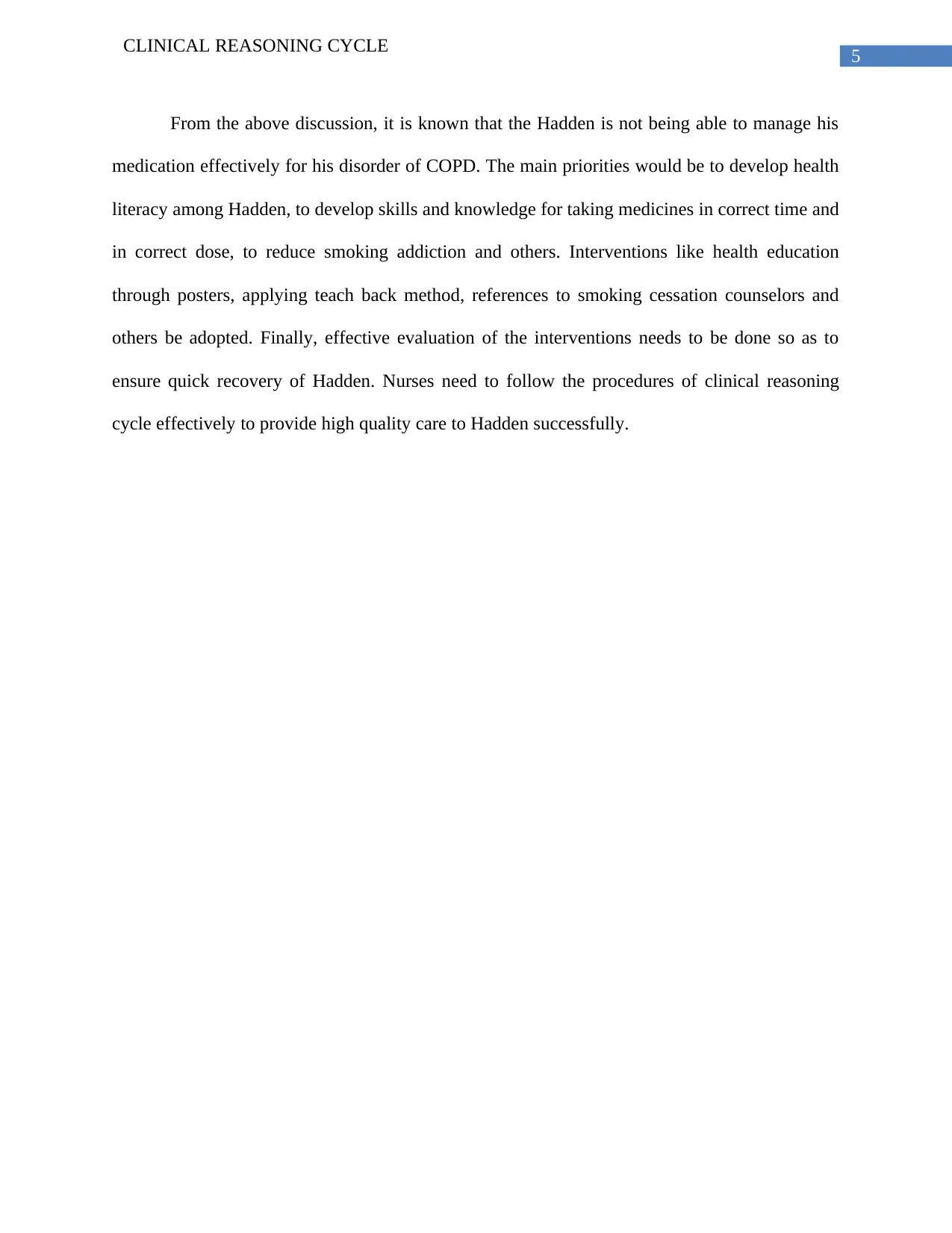
5
CLINICAL REASONING CYCLE
From the above discussion, it is known that the Hadden is not being able to manage his
medication effectively for his disorder of COPD. The main priorities would be to develop health
literacy among Hadden, to develop skills and knowledge for taking medicines in correct time and
in correct dose, to reduce smoking addiction and others. Interventions like health education
through posters, applying teach back method, references to smoking cessation counselors and
others be adopted. Finally, effective evaluation of the interventions needs to be done so as to
ensure quick recovery of Hadden. Nurses need to follow the procedures of clinical reasoning
cycle effectively to provide high quality care to Hadden successfully.
CLINICAL REASONING CYCLE
From the above discussion, it is known that the Hadden is not being able to manage his
medication effectively for his disorder of COPD. The main priorities would be to develop health
literacy among Hadden, to develop skills and knowledge for taking medicines in correct time and
in correct dose, to reduce smoking addiction and others. Interventions like health education
through posters, applying teach back method, references to smoking cessation counselors and
others be adopted. Finally, effective evaluation of the interventions needs to be done so as to
ensure quick recovery of Hadden. Nurses need to follow the procedures of clinical reasoning
cycle effectively to provide high quality care to Hadden successfully.
⊘ This is a preview!⊘
Do you want full access?
Subscribe today to unlock all pages.

Trusted by 1+ million students worldwide
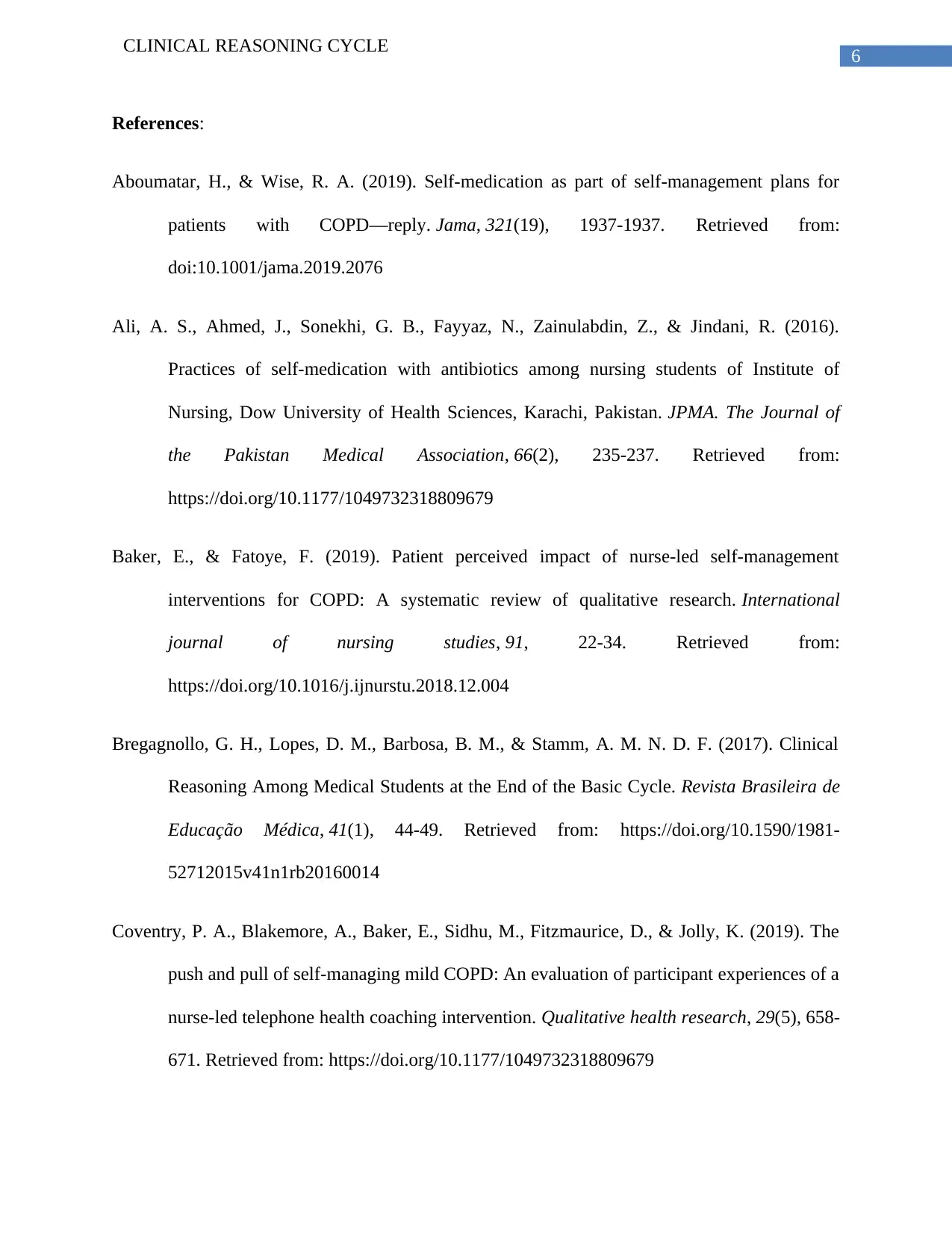
6
CLINICAL REASONING CYCLE
References:
Aboumatar, H., & Wise, R. A. (2019). Self-medication as part of self-management plans for
patients with COPD—reply. Jama, 321(19), 1937-1937. Retrieved from:
doi:10.1001/jama.2019.2076
Ali, A. S., Ahmed, J., Sonekhi, G. B., Fayyaz, N., Zainulabdin, Z., & Jindani, R. (2016).
Practices of self-medication with antibiotics among nursing students of Institute of
Nursing, Dow University of Health Sciences, Karachi, Pakistan. JPMA. The Journal of
the Pakistan Medical Association, 66(2), 235-237. Retrieved from:
https://doi.org/10.1177/1049732318809679
Baker, E., & Fatoye, F. (2019). Patient perceived impact of nurse-led self-management
interventions for COPD: A systematic review of qualitative research. International
journal of nursing studies, 91, 22-34. Retrieved from:
https://doi.org/10.1016/j.ijnurstu.2018.12.004
Bregagnollo, G. H., Lopes, D. M., Barbosa, B. M., & Stamm, A. M. N. D. F. (2017). Clinical
Reasoning Among Medical Students at the End of the Basic Cycle. Revista Brasileira de
Educação Médica, 41(1), 44-49. Retrieved from: https://doi.org/10.1590/1981-
52712015v41n1rb20160014
Coventry, P. A., Blakemore, A., Baker, E., Sidhu, M., Fitzmaurice, D., & Jolly, K. (2019). The
push and pull of self-managing mild COPD: An evaluation of participant experiences of a
nurse-led telephone health coaching intervention. Qualitative health research, 29(5), 658-
671. Retrieved from: https://doi.org/10.1177/1049732318809679
CLINICAL REASONING CYCLE
References:
Aboumatar, H., & Wise, R. A. (2019). Self-medication as part of self-management plans for
patients with COPD—reply. Jama, 321(19), 1937-1937. Retrieved from:
doi:10.1001/jama.2019.2076
Ali, A. S., Ahmed, J., Sonekhi, G. B., Fayyaz, N., Zainulabdin, Z., & Jindani, R. (2016).
Practices of self-medication with antibiotics among nursing students of Institute of
Nursing, Dow University of Health Sciences, Karachi, Pakistan. JPMA. The Journal of
the Pakistan Medical Association, 66(2), 235-237. Retrieved from:
https://doi.org/10.1177/1049732318809679
Baker, E., & Fatoye, F. (2019). Patient perceived impact of nurse-led self-management
interventions for COPD: A systematic review of qualitative research. International
journal of nursing studies, 91, 22-34. Retrieved from:
https://doi.org/10.1016/j.ijnurstu.2018.12.004
Bregagnollo, G. H., Lopes, D. M., Barbosa, B. M., & Stamm, A. M. N. D. F. (2017). Clinical
Reasoning Among Medical Students at the End of the Basic Cycle. Revista Brasileira de
Educação Médica, 41(1), 44-49. Retrieved from: https://doi.org/10.1590/1981-
52712015v41n1rb20160014
Coventry, P. A., Blakemore, A., Baker, E., Sidhu, M., Fitzmaurice, D., & Jolly, K. (2019). The
push and pull of self-managing mild COPD: An evaluation of participant experiences of a
nurse-led telephone health coaching intervention. Qualitative health research, 29(5), 658-
671. Retrieved from: https://doi.org/10.1177/1049732318809679
Paraphrase This Document
Need a fresh take? Get an instant paraphrase of this document with our AI Paraphraser
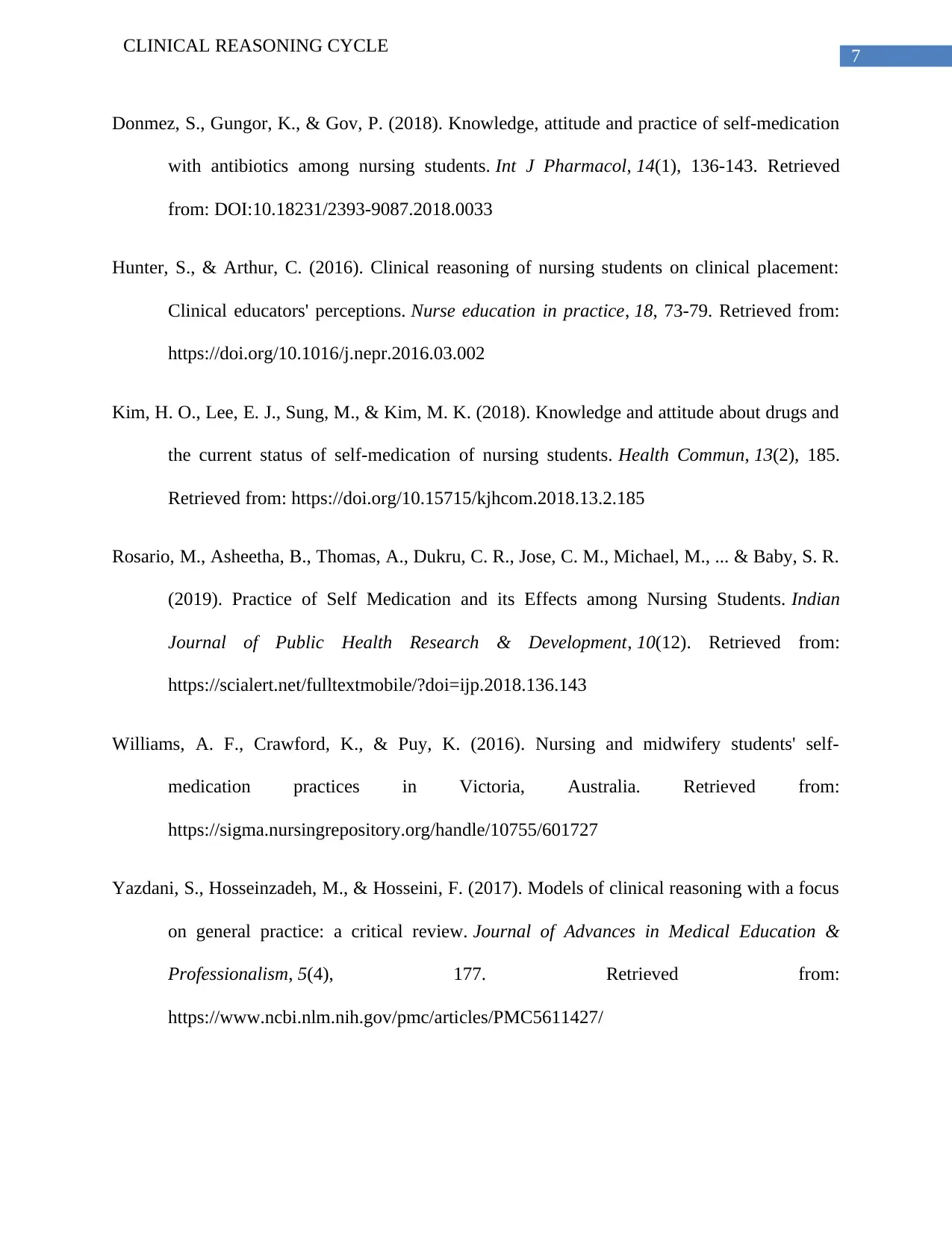
7
CLINICAL REASONING CYCLE
Donmez, S., Gungor, K., & Gov, P. (2018). Knowledge, attitude and practice of self-medication
with antibiotics among nursing students. Int J Pharmacol, 14(1), 136-143. Retrieved
from: DOI:10.18231/2393-9087.2018.0033
Hunter, S., & Arthur, C. (2016). Clinical reasoning of nursing students on clinical placement:
Clinical educators' perceptions. Nurse education in practice, 18, 73-79. Retrieved from:
https://doi.org/10.1016/j.nepr.2016.03.002
Kim, H. O., Lee, E. J., Sung, M., & Kim, M. K. (2018). Knowledge and attitude about drugs and
the current status of self-medication of nursing students. Health Commun, 13(2), 185.
Retrieved from: https://doi.org/10.15715/kjhcom.2018.13.2.185
Rosario, M., Asheetha, B., Thomas, A., Dukru, C. R., Jose, C. M., Michael, M., ... & Baby, S. R.
(2019). Practice of Self Medication and its Effects among Nursing Students. Indian
Journal of Public Health Research & Development, 10(12). Retrieved from:
https://scialert.net/fulltextmobile/?doi=ijp.2018.136.143
Williams, A. F., Crawford, K., & Puy, K. (2016). Nursing and midwifery students' self-
medication practices in Victoria, Australia. Retrieved from:
https://sigma.nursingrepository.org/handle/10755/601727
Yazdani, S., Hosseinzadeh, M., & Hosseini, F. (2017). Models of clinical reasoning with a focus
on general practice: a critical review. Journal of Advances in Medical Education &
Professionalism, 5(4), 177. Retrieved from:
https://www.ncbi.nlm.nih.gov/pmc/articles/PMC5611427/
CLINICAL REASONING CYCLE
Donmez, S., Gungor, K., & Gov, P. (2018). Knowledge, attitude and practice of self-medication
with antibiotics among nursing students. Int J Pharmacol, 14(1), 136-143. Retrieved
from: DOI:10.18231/2393-9087.2018.0033
Hunter, S., & Arthur, C. (2016). Clinical reasoning of nursing students on clinical placement:
Clinical educators' perceptions. Nurse education in practice, 18, 73-79. Retrieved from:
https://doi.org/10.1016/j.nepr.2016.03.002
Kim, H. O., Lee, E. J., Sung, M., & Kim, M. K. (2018). Knowledge and attitude about drugs and
the current status of self-medication of nursing students. Health Commun, 13(2), 185.
Retrieved from: https://doi.org/10.15715/kjhcom.2018.13.2.185
Rosario, M., Asheetha, B., Thomas, A., Dukru, C. R., Jose, C. M., Michael, M., ... & Baby, S. R.
(2019). Practice of Self Medication and its Effects among Nursing Students. Indian
Journal of Public Health Research & Development, 10(12). Retrieved from:
https://scialert.net/fulltextmobile/?doi=ijp.2018.136.143
Williams, A. F., Crawford, K., & Puy, K. (2016). Nursing and midwifery students' self-
medication practices in Victoria, Australia. Retrieved from:
https://sigma.nursingrepository.org/handle/10755/601727
Yazdani, S., Hosseinzadeh, M., & Hosseini, F. (2017). Models of clinical reasoning with a focus
on general practice: a critical review. Journal of Advances in Medical Education &
Professionalism, 5(4), 177. Retrieved from:
https://www.ncbi.nlm.nih.gov/pmc/articles/PMC5611427/
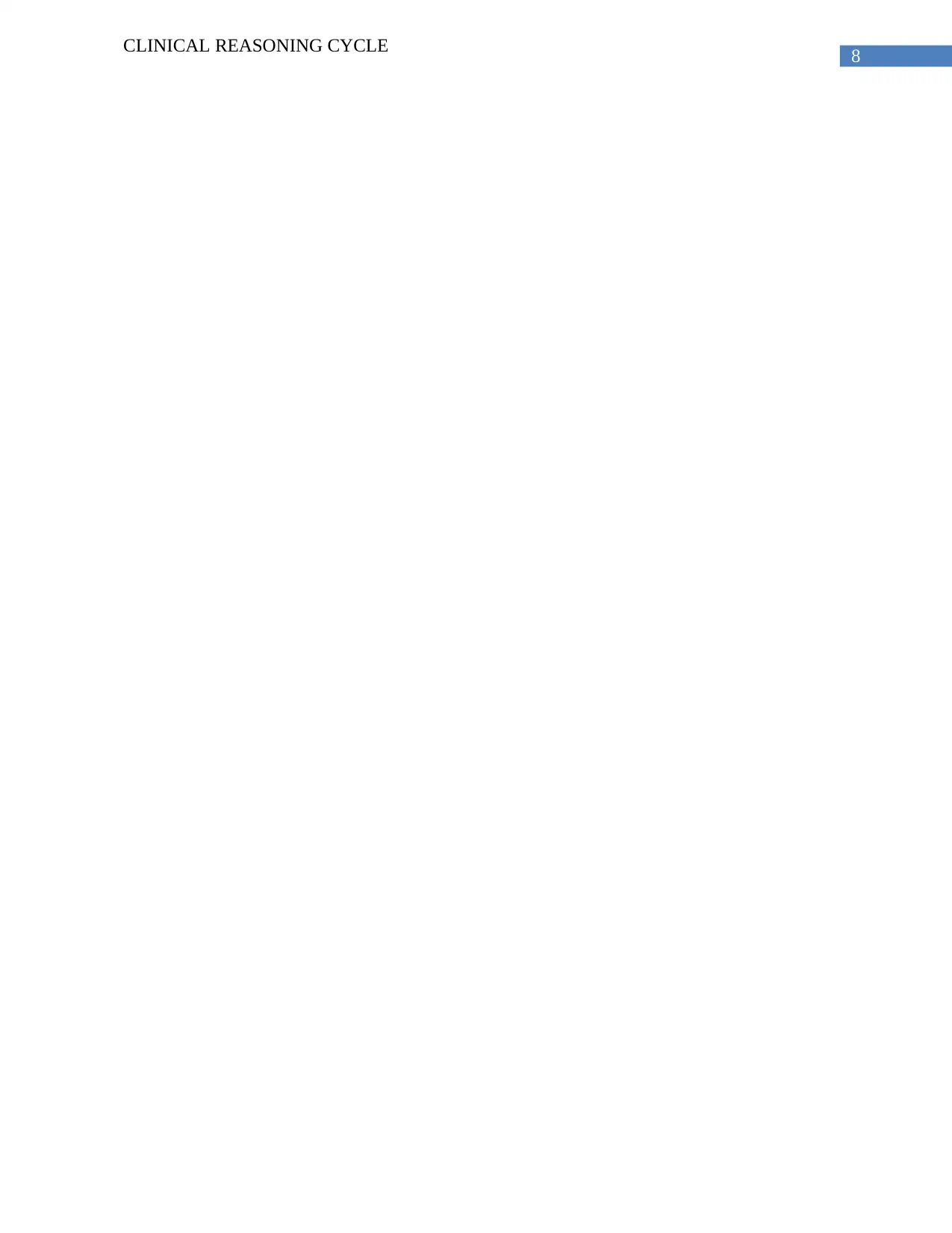
8
CLINICAL REASONING CYCLE
CLINICAL REASONING CYCLE
⊘ This is a preview!⊘
Do you want full access?
Subscribe today to unlock all pages.

Trusted by 1+ million students worldwide
1 out of 9
Related Documents
Your All-in-One AI-Powered Toolkit for Academic Success.
+13062052269
info@desklib.com
Available 24*7 on WhatsApp / Email
![[object Object]](/_next/static/media/star-bottom.7253800d.svg)
Unlock your academic potential
Copyright © 2020–2026 A2Z Services. All Rights Reserved. Developed and managed by ZUCOL.





